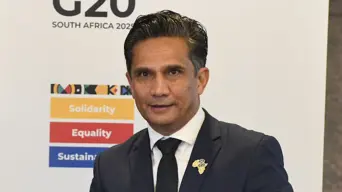DIRCO delegation meets US officials, clarifies SA's expropriation, equity laws
It said that a delegation led by its director-general, and G20 sherpa, Zane Dangor, had followed through with discussions initiated by former US ambassador, Ebrahim Rasool, before his expulsion by the US state department in March.

South Africa's G20 Sherpa and DIRCO Director-General, Zane Dangor. Picture: @g20org/X
CAPE TOWN - The Department of International Relations and Cooperation (DIRCO) said it had set the record straight with senior White House and US state department officials about the country’s expropriation and equity laws.
It said that a delegation led by its director-general and G20 sherpa, Zane Dangor, had followed through with discussions initiated by former US ambassador, Ebrahim Rasool, before his expulsion by the US state department in March.
The department said it was satisfied that key issues and misconceptions had been clarified following disinformation campaigns by lobby groups who’ve travelled to the US to complain about the treatment of white minority groups.
Last week, Dangor addressed the United Nations General Assembly on the country's priorities for its G20 presidency.
He followed that up with meetings with the US administration's National Security Council's Africa director, acting assistant secretary of state for African affairs, as well as treasury department representatives.
Spokesperson Chrispin Phiri said the delegation explained that the expropriation law's nil compensation clause was not designed to facilitate unlawful land seizures.
"We believe these dialogues will assist to refine the current administration's understanding of South Africa's position on critical matters, fostering a more nuanced perspective."
Phiri said that the delegation also addressed misconceptions on laws which had been presented as race laws designed to undermine minority rights, explaining that these were intended to address structural inequality as a legacy of apartheid.
The department said these engagements would be carried out at various levels of government following the executive order issued against South Africa in February, in which the US has cut health aid to the country and offered refuge to Afrikaners who claim they are being persecuted.